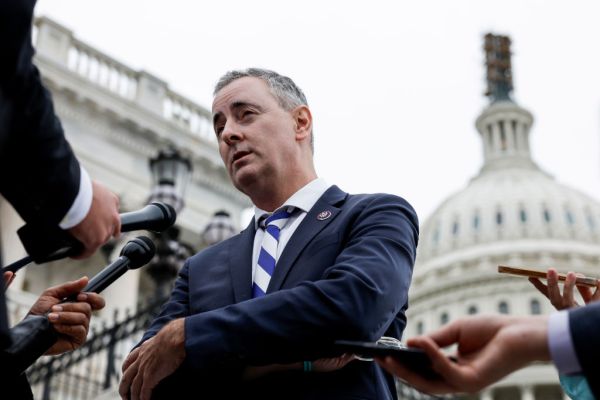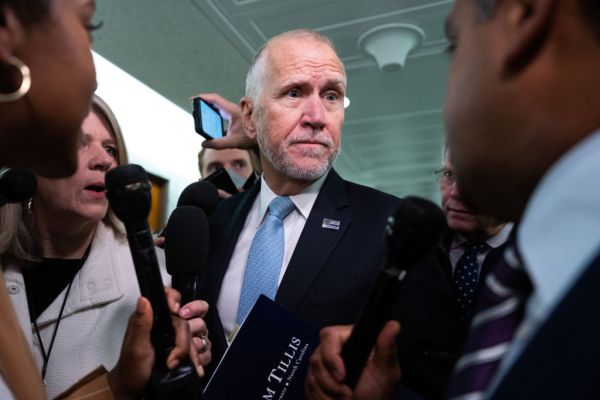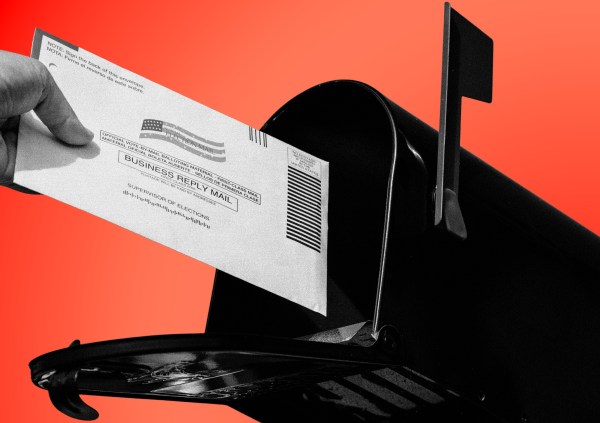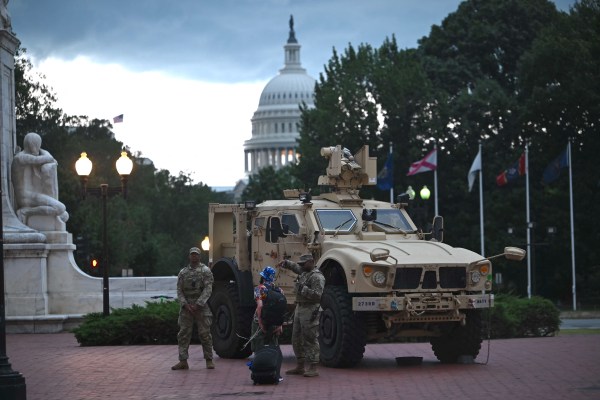After No Labels abandoned its attempt to put forth a bipartisan presidential ticket back in April, many thought the group would have little influence going forward. During the 2024 election cycle, the independent political organization that encourages political opponents to work together enjoyed perhaps the most publicity of its 14-year history, only for its efforts to meet an anticlimactic end.
But judging by the high-profile lineup assembled at its national meeting Thursday, the group may yet be a force in future elections. Members of both parties serving in both chambers of Congress—most facing tough reelection battles in 2026—spoke to the crowd that filled the Grand Ballroom of the Mayflower Hotel in Washington, D.C. And making no apologies for its presidential efforts, No Labels’ leadership is not shy about its plans for the upcoming midterms.
“We’re going to be really active in ‘26 in mobilizing our members to support the allies in our coalition,” No Labels chief strategist Ryan Clancy told The Dispatch. “So that means grassroots activation. It means getting citizens engaged to email, write letters, go to town halls. It means getting our members to contribute to the campaigns of these members.”
Perhaps that is why several moderate members of both parties showed up to tout their bipartisan bona fides and commit to working with their political opponents to solve issues such as inflation, immigration, and the national debt. The list included House members from swing districts such as Reps. Don Bacon of Nebraska, Marie Gluesenkamp Perez of Washington, and Jared Golden of Maine, as well as Sen. Thom Tillis of North Carolina. Additionally, attendees heard from those who might be eyeing a run for higher office, including Reps. Mike Lawler of New York and Dan Meuser of Pennsylvania, both viewed as potential gubernatorial candidates next cycle. Rep. Josh Gottheimer, who also attended, has already declared for the New Jersey governorship in 2025.
Bacon just won a fifth term in his district by close to 2 points, while Vice President Kamala Harris carried it over Donald Trump by more than 4.5 points, and he thanked No Labels members for their help.
“There’s only three Republican districts in Congress right now that Harris won. In 2020, it was 18 Biden-Republican districts. Now we’re at three, and I have the unenviable position of being in the biggest Harris district with a Republican in the seat,” Bacon told the crowd. I wouldn’t be here today without you.”
Although Republicans won control of Congress and the White House, much of the discussion turned on how elected officials would still need to work together to compromise, especially with Republicans’ small edge in the House.
“There is opportunity to actually get stuff done if you’re willing to work on it. All of these people on the stage are willing to do that and do it effectively,” Lawler said during a panel discussion with Meuser and other House members. “So I think the key is to continue to find the area of opportunity, to find the area of agreement, not focus on the area of disagreement, and not demand absolutism.”
Speakers also emphasized the grief they got from their left and right flanks. Democratic Rep. Seth Moulton, who represents a deep-blue district in Massachusetts, infuriated some in his party with his post-election comments about biological males participating in women’s sports, telling the New York Times he did not want his two daughters “getting run over on a playing field by a male or formerly male athlete.” At the conference Thursday, he used that controversy to articulate his critique of his party.
“I believe deeply in my party’s values: honesty, compassion, belief in true facts, science, a desire to help the underserved, the underrepresented, not to scapegoat and marginalize them,” he said. “These are firm foundations in our party’s history, but today, too many people feel that Democrats are out of touch. We’ve worked so hard to become so tolerant of every little narrow group that, as a whole, we’ve become intolerant if you don’t check the box on every one of those issues.”
But amid all the talk of bipartisanship and unity there was also a feeling of grievance from No Labels’ leadership, aimed at what it views as dirty tricks from Democratic-aligned groups who saw the possibility of a unity ticket on the ballot as a threat to President Joe Biden. Conference attendees received folders that contained, along with the day’s schedule and speaker bios, printed versions of articles that detailed such activities. An editorial from the Dallas Morning News claimed that “Democrats tried to destroy No Labels.” A piece from independent journalist Matt Taibbi purported to show Democratic groups hitting No Labels “with an array of underhanded schemes that put Watergate tricksters to shame.”
After No Labels sued the creators of a website seemingly intended to hurt the organization, documents brought to light in discovery revealed what No Labels believed was an organized effort by leaders of groups such as Third Way and MoveOn to stop its potential bid.
“You had a very organized effort from the very beginning to destroy us and keep us off the ballot,” Clancy told The Dispatch. He added that No Labels did not receive such treatment from Republicans or their allies.
Clancy said such efforts were not the primary reason the group could not put forth a unity ticket but that it was “one of the chief ones.” The main factor in the spring decision to stop the efforts, he said, repeating what the group’s leadership asserted at the time, was that No Labels could not find a candidate who could actually win. Of course, things did change after Biden dropped out months later, giving way to Harris.
Reporting in the Dispatch Politics newsletter indicated that Republican recruits balked at the opportunity to run on a bipartisan presidential ticket for a number of reasons, including a lack of plans for campaign infrastructure and support. Clancy argued that building such infrastructure was incumbent on the campaign that would have been conceived, not the group itself.
“Our job was to build the infrastructure of ballot access, to have a line in all these states where a candidate could put their name on it, and on that score, we were exactly where we needed to be by the spring,” he said. “We were hitting every single target we set for ballot boxes. Now, if there was a ticket and then they had to build a campaign, well, the campaign itself would have to build that infrastructure.”
He also cited fears of partisan pushback as a deterrent to candidates.
“I think a lot of the candidates we talked to, they just didn’t feel like the risk was going to be worth the reward because one of the things that was absolutely true is if anybody came on our ticket, if they had any potential future in their mind in either the Republican or Democratic Party, they would be jeopardizing it because the parties don’t like competition, and they don’t like people stepping out of line,” Clancy said.










Please note that we at The Dispatch hold ourselves, our work, and our commenters to a higher standard than other places on the internet. We welcome comments that foster genuine debate or discussion—including comments critical of us or our work—but responses that include ad hominem attacks on fellow Dispatch members or are intended to stoke fear and anger may be moderated.
With your membership, you only have the ability to comment on The Morning Dispatch articles. Consider upgrading to join the conversation everywhere.